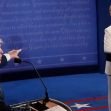The fallout from disputes over Hillary Clinton’s emails continued recently when the Ninth Circuit denied attorney’s fees to the lawyer who successfully used the Freedom of Information Act (FOIA) to obtain redacted information about a search warrant issued by the FBI.
A three-judge panel from the United States Court of Appeals for the Ninth Circuit on June 30, unanimously ruled that plaintiff-appellant E. Randol Schoenberg, the attorney, failed to satisfy all four elements that are required to receive attorney’s fees after a successful FOIA challenge. Although he met three parts of the test, he failed the fourth and most important criteria. He was unable to show that the FBI was unreasonable when it withheld critical information after relying on the “sealing order” from the Southern District of New York (SDNY). His request for $10,185 was denied.
Schoenberg sought the information because Hillary Clinton’s emails were a major issue in the 2016 presidential campaign that ultimately elected Donald Trump. Schoenberg’s initial complaint asked for the unredacted search warrant because, “The public benefit in this case was very significant, as there was widespread national interest in the search warrant…Several of the news reports noted that the significant redaction of the material made it difficult to draw conclusions about whether there had been sufficient probable cause to support the search.”
Writing for the unanimous panel, Judge Ryan D. Nelson’s opinion reviewed the facts that led to the denial of attorney’s fees. The case began in 2016 when the SDNY issued a search warrant related to the FBI’s investigation into Clinton’s emails while she was serving as Secretary of State. The warrant gave the FBI permission to recover email from the laptop owned by former Congressman Anthony Weiner, who at the time was married to Huma Abedin, one of Clinton’s top aides. Weiner had resigned from Congress in 2011 after posting a sexually inappropriate photo on Twitter, which was located and publicized.
As a result of what the FBI called the “confidential nature of the investigation,” the FBI requested that SDNY seal the warrant. This was done and led to Schoenberg’s filing of a FOIA request that asked SDNY to unseal the warrant. This was granted, but the names of Weiner and Abedin were redacted due to SDNY’s desire to protect them and ensure their privacy. The FBI also argued that their names were part of sealed court records. Schoenberg appealed the denial, but the FBI again refused his request for the same reason.
Still seeking the information, Schoenberg filed another FOIA request in March 2018 in the Central District of California. At the same time, the Office of the Inspector General (IG) was working on a report that would also feature the warrant material. Unlike Schoenberg, the IG’s request to the SDNY for redacted material was granted. Only the name of the investigating FBI agent and Abedin’s personal email remained redacted. The FBI sent Schoenberg a copy.
Reasoning that he was at least partly responsible for the information release, he asked the Central District of California to give him attorney’s fees. The court pointed out that the IG was responsible for many of the “unredactions,” and then subjected Schoenberg’s request to a four-part test that is required before attorney’s fees can be allowed. This test would determine whether the “FBI’s reasons for withholding the unredacted information were legally insufficient.”
The test has four parts. Schoenberg had to show there was (1) public benefit to the information; (2) the information would commercially benefit him; (3) the nature of Schoenberg’s interest in the information and: (4) the legal reasonableness of the FBI’s withholding. The District Court again ruled against Schoenberg when it concluded that although he satisfied the first three parts of the test, the fourth part “outweighed the other factors.” He lost and appealed yet again.
Nelson then clarified the court’s standard of review, which stated that a denial of fees would not be reversed absent a finding of abuse of discretion that only occurs when a district court “reaches a result that is illogical, implausible, or without support…from the record.”
The court explained that attorney’s fees could be permitted under the FOIA if Schoenberg had “substantially prevailed in his FOIA suit.” No one disputed Schoenberg’s eligibility because he had met the test for the first three factors. Nelson made it clear, however, that the Ninth Circuit’s decision would only be based on a review of the “fourth entitlement factor” and whether the district court had “erred in balancing the factors.” No error was found after the court reviewed the “reasonableness” of the district court’s conclusions because the “record supports the finding that the FBI reasonably relied on the SDNY’s sealing order.”
Nelson also disagreed with Schoenberg’s contention that the district court did not properly balance the four factors. He cited precedent that left the “relative weighing of those sliding scales to the district court.” For these reasons, the holding of the district court was affirmed.
After the denial, Schoenberg spoke to MetNews and said, “In November 2016, I set out to find out what probable cause the FBI had for the last-minute search warrant against Hillary Clinton, which found nothing incriminating as it turned out. Although my efforts took years and were largely successful, I was denied even a modest attorney’s fee award, which is disappointing. But the larger point remains…”
And that is a point that many believe, at least in part, contributed to Trump’s victory. The new “unredactions” were disclosed by FBI Director James Comey on the eve of the election. Schoenberg said that Comey’s disclosure of the findings of a search warrant that was issued without probable cause “likely decidedly tilted the scales in favor of Donald Trump.”






